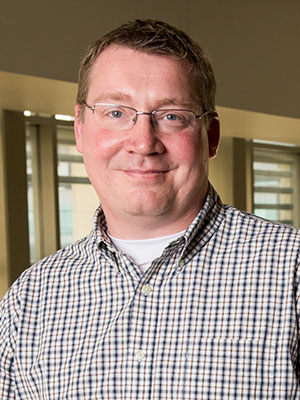- Affiliated Faculty, Biomedical Engineering
- Associate Professor of Molecular and Cellular Medicine
- Phone: 254-771-6816
- FAX: 254-771-6839
- Email: CGregory@medicine.tamhsc.edu

Educational Background
- Postdoctoral, University of Manchester Medical School
- Ph.D., Biochemistry & Molecular Biology, University of Manchester
- B.S., Biochemistry, University of York
Research Interests
-
Dr. Carl Gregory is an assistant professor of molecular and cellular medicine at the Texas A&M Health Science Center College of Medicine Institute for Regenerative Medicine (IRM) at Scott & White Hospital. His research interests include:
General Biology of MSCs:
Mesenchymal stem cells (MSCs) are purified from bone marrow based on their ability to adhere to plastic. The resulting cultures are therefore heterogeneous, contaminated with small numbers of differentiated cells such as fibroblasts and osteoblasts. As MSCs are further expanded, they gradually lose their plasticity and proliferative activity. In some cases, therefore, the quality and purity of MSC preparations can seriously influence their efficacy. Dr. Gregory’s lab has been examining the biology of MSCs with a view to develop rapid molecular markers and tests for evaluating/purifying maximally efficacious cultures of MSCs. For example, the group has recently demonstrated leukemia inhibitory factor secretion is a robust predictor of differentiation potential.
MSCs and bone healing:
The group specializes in bone repair by MSCs. Based on detailed characterization of the molecular mechanism of osteoblast differentiation by MSCs, a novel and effective bone regeneration strategy has been developed. This strategy, based on pharmaceutical conditioning of MSC cultures prior to administration in a specialized matrix, re-initiates bone formation in non-healing bone defects in mice. Further trials in large animals are planned.
Malignant bone disease:
Many tumors of the skeleton destroy bone tissue to facilitate their expansion and metastasis. Furthermore, the mechanisms by which some tumors inhibit the repair of host bone, often increase the aggressiveness of the tumor cells themselves. The Gregory group contributed to the discovery that Dkk-1, a secreted inhibitor of the Wnt pathway inhibits the repair of bone by MSCs. When Dkk-1 is over expressed by osteosarcoma cells, they are more effective in destroying and infiltrating bone. The tumor cells themselves also respond in an autocrine manner to Dkk-1 by becoming highly primitive and highly proliferative, thus becoming a highly aggressive tumor. The group is currently examining the effects of various small molecules and immunological strategies for the safe and effective inhibition of Dkk-1 activity in bone tumors.